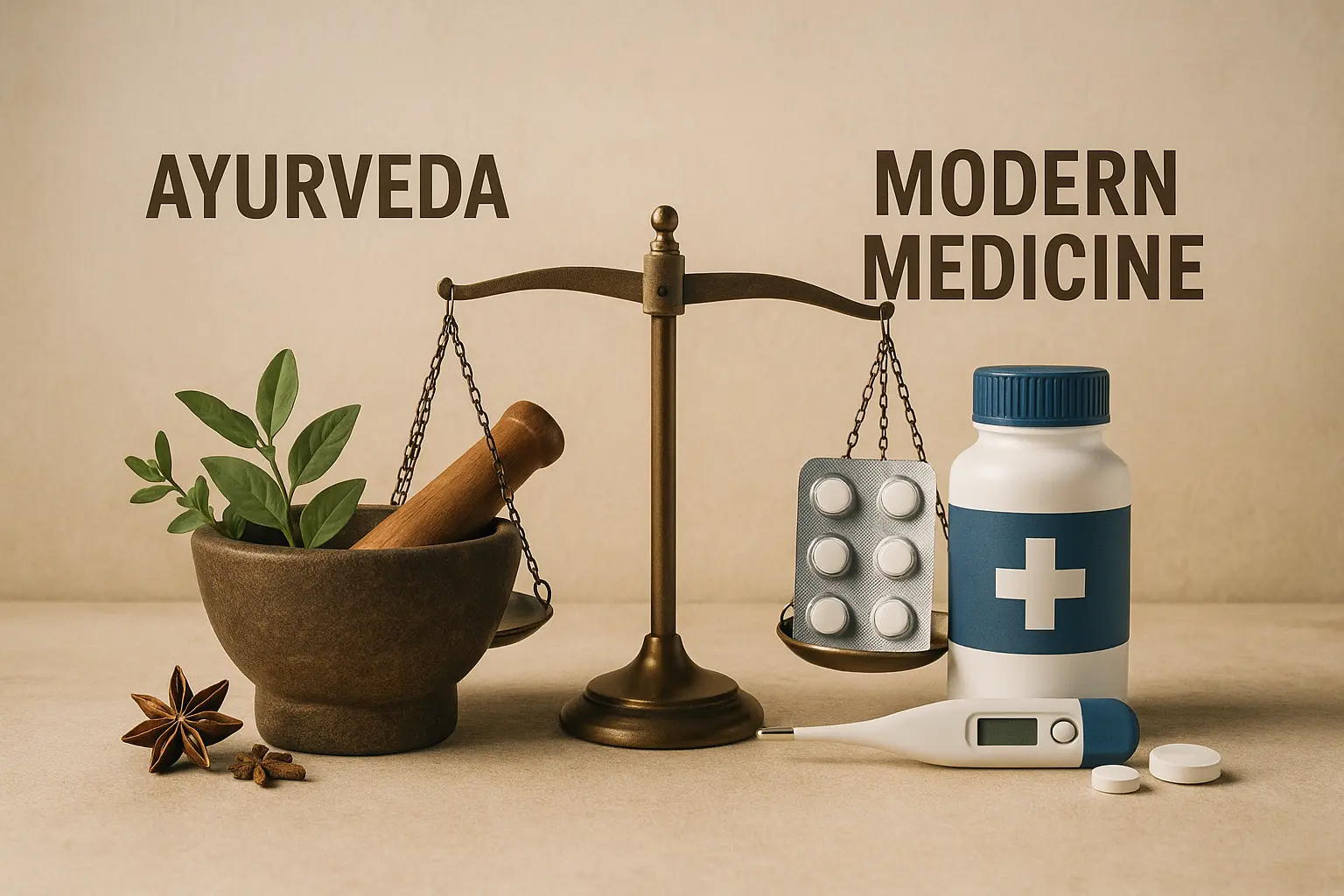Ayurveda vs Modern Medicine: Finding the Right Balance for Your Health
For healthcare, people ask which of the two systems—Ayurveda or modern medicine—is more beneficial. Both types of systems are different in their methods, advantages, and difficulties. When you know their differences and try to integrate them, you can have a healthier and well-balanced life. This article looks into the main differences between Ayurveda and modern medicine, when each is the better option and how to achieve a good balance for your health.
1. What is Ayurveda?
Ayurveda started as a form of medicine in India long before 5,000 years ago. Ayurveda is made up of two words from Sanskrit: Ayur (life) and Veda (knowledge), which together signify the knowledge about life.
Core Principles of Ayurveda:
- Balance of the Doshas: Health is thought to depend on maintaining balance between the three doshas—Vata, Pitta, and Kapha. These doshas work as energies that oversee various activities of the body and mind.
- Holistic Health: Ayurveda considers the body, mind, and spirit as working as one unit. It addresses health problems by dealing with the main cause, not just the symptoms.
- Natural Healing: Treatment options in Ayurveda include herbal remedies, changes in one’s diet, changes in habits and routine, and therapies like Panchakarma (a series of cleansing actions).
The purpose of Ayurveda is to create balance in both body and mind for ongoing wellness, vitality, and to prevent disease.
2. What is Modern Medicine?
Modern medicine, or allopathy, involves treating diseases and conditions with medical research, drugs, and surgery. It follows the scientific method, so treatments are usually tested in clinical trials and supported by research data.
Core Principles of Modern Medicine:
- Symptom and Disease Treatment: Medicine nowadays usually focuses on finding and curing particular health problems. The main focus is on serious and urgent conditions, and medicines, operations, and medical devices are often used to treat or cure patients.
- Technological Advancements: Doctors now rely on MRI, X-ray, and blood tests to help detect and manage illnesses.
- Pharmaceutical Interventions: Modern medicine relies on medications, vaccines, and different treatments.
Although modern medicine treats serious and urgent health issues very well, it often fails to find out what causes chronic diseases and mainly tries to manage the symptoms.
3. Key Differences Between Ayurveda and Modern Medicine
Approach to Health:
- Ayurveda: Concerned with the whole person—the mind, the body, and the spirit. Its purpose is to maintain balance and harmony and it tries to tackle the main reason for an illness.
- Modern Medicine: Mainly concerned with spotting symptoms and treating illnesses right away to control them. It deals with certain conditions by having specialists in those areas.
Treatment Modalities:
- Ayurveda: Treats illnesses with herbal medicine, diet, adjustments to lifestyle, and detoxification therapies. It focuses on keeping health problems from happening and supporting long-term wellness.
- Modern Medicine: Uses drugs, surgery, modern medical technology, and tests to manage diseases and sicknesses.
Duration of Treatment:
- Ayurveda: Continued care that aims to restore balance and stop more health issues from forming. It stresses the idea that healing comes slowly with changes to your lifestyle.
- Modern Medicine: Fast results are common with emergency care, but it mainly seeks to treat severe problems and keep symptoms under control.
4. When to Choose Ayurveda
Treating chronic conditions, focusing on prevention, and restoring balance to body systems are some of Ayurveda’s main benefits. It is good at helping the body heal itself and treating the person as a whole, not just a specific illness or sign.
Conditions Ayurveda Excels In:
- Chronic Diseases: Treatments in Ayurveda may help with arthritis, IBS, diabetes, and chronic fatigue, since the focus is on restoring balance and lasting comfort.
- Digestive Issues: Digestive problems such as gastritis, acid reflux, and constipation may be treated very well in Ayurveda with proper diet, natural remedies, and detoxification.
- Stress Management: Ayurvedic herbs such as Ashwagandha and Brahmi strengthen the body’s ability to deal with stress and anxiety.
- Preventative Care: The main approach in Ayurveda is to change your diet, add exercise, and modify your daily habits to reduce the risk of disease and live healthily for many years.
5. When to Choose Modern Medicine
Doctors depend on modern medicine mostly for sudden and serious illnesses that should be treated quickly. It is very helpful in handling emergencies, severe infections, and illnesses that are potentially life-threatening.
Conditions Modern Medicine Excels In:
- Fast responses: Modern medicine is critical for fast responses to pneumonia, heart attacks, and fractures.
- Antibiotics and Vaccines: Useful for treating bacterial diseases, viruses, and preventing diseases from spreading.
- Surgical Care: Advanced techniques in surgery have a high success rate for treating cancer, fixing injuries, or replacing joints.
- Managing Long-Term Conditions: Helps manage the symptoms and prevents diseases such as hypertension, diabetes, and asthma from worsening.
Integrating Ayurveda and Modern Medicine
Integrating Ayurveda and modern medicine can provide the best care. Modern medicine addresses urgent needs, while Ayurveda supports long-term health and wellness.
Conclusion
Both Ayurveda and modern medicine have their own advantages and support good health. Ayurveda helps people stay healthy in the long run, but modern medicine is better at handling urgent and sudden health problems. A good balance between the two allows you to get immediate medical care when needed and still enjoy the lasting health and strength that come from Ayurveda.
